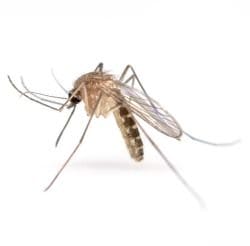Mosquitoes

Identification
Mosquitoes typically have a brownish color but may also appear gray or black.
Mosquitoes measure from 2 to 10 millimeters in length.
Mosquitoes are known for their irritating bites and disease-carrying ability. However, the physical structure of these tiny insects is also worth exploring. Mosquitoes have slender bodies divided into the head, thorax, and abdomen. The head contains the mosquito’s sensory organs, such as its two compound eyes and antennae.
Get A Free Quote
We are affordable Pest Control Service in GTA & Surroundings Areas.
What are mosquitoes, and where do they come from?
Mosquitoes are small flying insects known for their itchy bites and ability to transmit deadly diseases such as malaria, dengue fever, and Zika virus. These insects belong to the family Culicidae. Most mosquitoes have slender bodies with long legs and wings. The colour of their body varies depending on the species.
They thrive in warm and humid environments like marshes, swamps, and wetlands. Mosquitoes lay their eggs in stagnant water sources like ponds or artificial containers such as buckets or discarded tires. The larvae hatch from these eggs and live in water until they emerge as adults after a week or two.
Enhance your outdoor experience by reducing mosquito and crane flies populations with our guide to creating a mosquito-free and enjoyable living space.
Biology of Mosquitoes: How they fly, what they eat, how they reproduce
Mosquitoes are small, flying insects that belong to the Culicidae family. They are known for their blood-sucking capabilities, which they use to feed on humans and animals alike.
Mosquitoes have an intricate biology that allows them to fly up to 1-1.5 miles per hour and reach heights of over 25 feet. Their wings beat incredibly fast rates, around 400-600 times per second, allowing them to generate lift and stay airborne. Mosquitoes primarily feed on nectar from flowers and plants, but females require blood meals to develop their eggs.
Female mosquitoes lay their eggs in standing water or areas prone to flooding, such as drains or ditches. Once hatched, mosquito larvae live in water until they pupate into adults within just a few days. After emerging from their pupal cases as fully developed adult mosquitoes, females seek out a host for a blood meal before reproducing themselves.
Understanding the biology of mosquitoes is crucial for controlling populations and preventing the spread of diseases such as malaria, dengue fever, Zika virus, and West Nile virus that can be transmitted through mosquito bites. By knowing how they fly, what they eat, and how they reproduce, we can better protect ourselves against these pesky pests while preserving our ecosystem’s delicate balance.
Mosquito Diseases: What mosquitoes can transmit, the most common ones and their symptoms
Mosquitoes are one of the deadliest insects on earth. They transmit various diseases, including malaria, dengue fever, Zika virus, West Nile virus and yellow fever. These diseases can cause mild to severe symptoms and may even be fatal in some cases.
Malaria is one of the most common mosquito-borne illnesses. It is caused by a parasite that infects red blood cells and is transmitted to humans through mosquito bites. Symptoms include fever, chills, headache and muscle pain. Malaria can be treated with medication but can also lead to severe complications if left untreated.
Dengue fever is another disease transmitted by mosquitoes that causes high fever, severe headache and joint pain. The symptoms usually appear three to fourteen days after infection and last up to a week.
Residential Pest Control Service
Customized pest control treatments can be used to safeguard your living space against bothersome pests and ensure that they don’t become a nuisance in your home.
Conclusion: Tips on How to Avoid Mosquito Bites and Reduce Your Risk of Disease
In conclusion, avoiding mosquito bites should be a top priority for anyone who wants to reduce their disease risk. One of the best ways to do this is by wearing protective clothing such as long-sleeved shirts and pants, especially when venturing into areas with high mosquito populations. Additionally, using insect repellents that can help keep mosquitoes at bay.
Another effective way to avoid mosquito bites is by eliminating standing water in your surroundings, which serves as breeding grounds for mosquitoes. This can include things like birdbaths, flower pots, and even gutters. Installing screens on windows and doors can also help prevent mosquitoes from entering your home.
Finally, it’s essential to be aware of peak mosquito activity times—dawn and dusk—and take extra precautions during these hours. By following these tips and adopting good habits that minimize mosquito exposure, you can enjoy the outdoors without worrying about getting bitten or contracting diseases.
